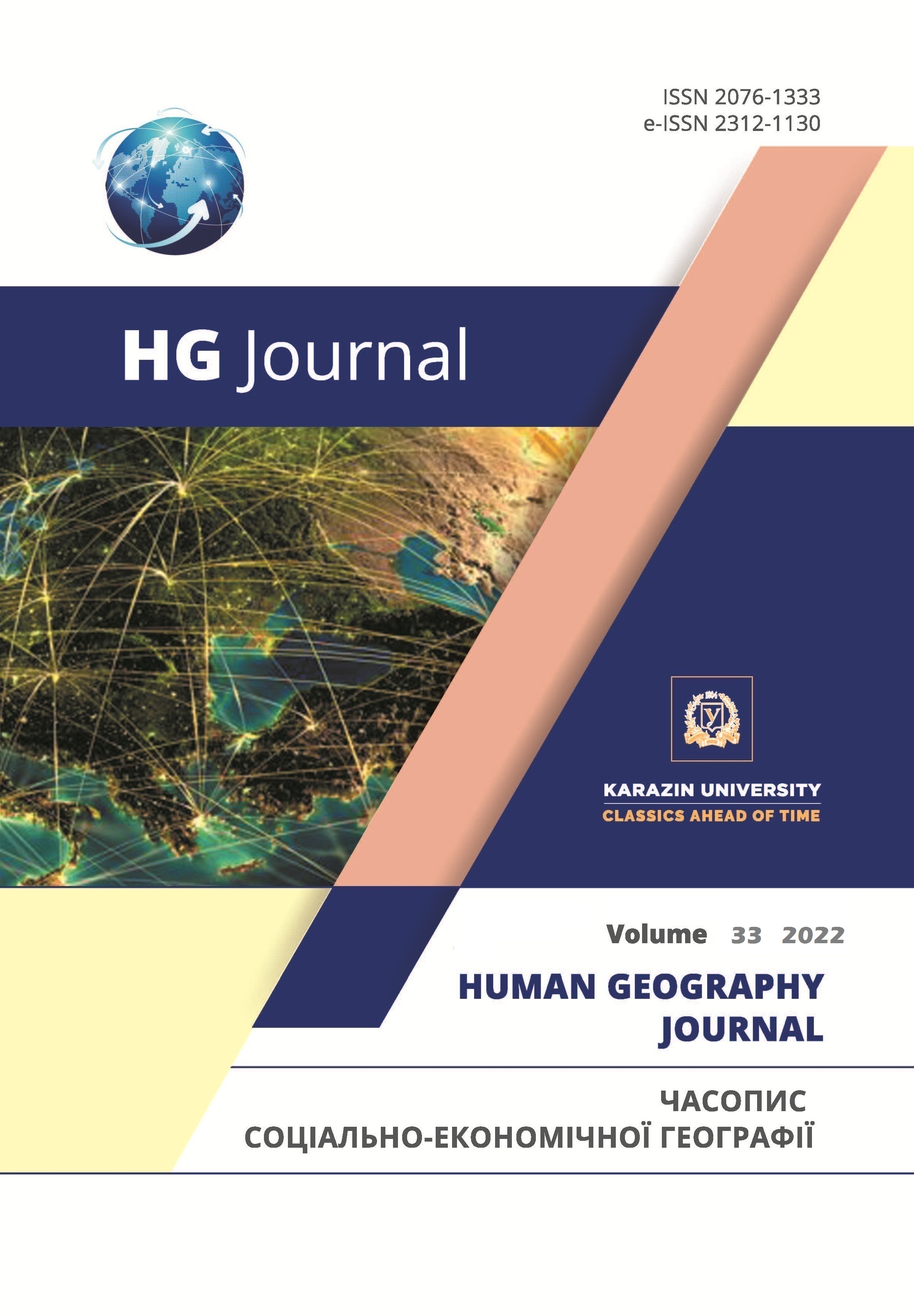Temporary trends and factors of birth rate in Ukraine: regional dimension
Abstract
The demographic problem is surprisingly acute for Ukraine. Research trends factors and structural and dynamic features of birth rate will allow determining socio-economic and demographic trends, including their variations across regions. The purpose of the article is to establish regional features of modern trends and factors of fertility in Ukraine in the 21st century. The article presents an analysis of the dynamics of the birth rate in Ukraine based on the analysis of official statistics. Periods of minimum and maximum values have been established taking into account the leading factors and differences by type of settlements. The characteristics of changes in the sex-age structure of the population of Ukraine and the age-related fertility rate in the context of leading factors and differences by types of settlements are given.
Based on the standardization of demographic coefficients, the degree of influence of internal factors affecting the birth rate in the regions of Ukraine was determined. A significant share of births in older fertility groups was identified, which confirms the trends of the second demographic transition, the spread of the phenomenon of "late motherhood" and the so-called "pro-European" model of reproductive behavior, which is more characteristic of highly urbanized regions of Ukraine. On the basis of cluster analysis, regional peculiarities of trends and factors of fertility in Ukraine in the 21st century were revealed, as a result, five clusters were identified. The first cluster includes the capital. The second cluster includes Zakarpattya, Rivne, and Volyn regions, which have the most lively demographic behavior of the population and the preservation of traditional factors. The third cluster united Kharkiv, Sumy, Cherkasy, Chernihiv, Poltava, Zaporizhzhya and Dnipropetrovsk regions. The fourth cluster is represented by Odesa, Lviv, Chernivtsi and Ivano-Frankivsk regions. The fifth cluster includes Mykolaiv, Kirovohrad, Ternopil, Kyiv, Kherson, Zhytomyr, Khmelnytskyi, and Vinnytsia regions. Thus, internal territorial differences in the birth rate, in terms of regions of Ukraine, as well as urban and rural areas, are the result of the action of external and internal factors that had an impact during the studied period and were reflected in the course of demographic processes.
Downloads
References
Aksyonova, S.Yu., & Kurylo, I.O. (2018). Vidkladannia narodzhen v Ukraini kriz pryzmu realnykh pokolin zhinok [Postponement of births in Ukraine through the prism of the reality of generations of women]. Demohrafiia ta sotsialna ekonomika – Demography and Social Economy, 3 (34), 11-25. https://doi.org/10.15407/dse2018.03.01 [in Ukrainian].
Aksyonova, S.Yu. (2021). Vik materynstva u konteksti tsinnosti chasu [Maternity age in the context of the value of time]. Demohrafiia ta sotsialna ekonomika – Demography and social economy, 2(44), 56-73. https://doi.org/10.15407/dse2021.02.056 [in Ukrainian].
Demohrafichna sytuatsiia v Ukraini v period nezalezhnosti [The demographic situation in Ukraine during the period of independence]. slovoidilo.ua. Retrieved from https://www.slovoidilo.ua/2020/08/21/infografika/suspilstvo/demohrafichna-sytuacziya-ukrayini-period-nezalezhnosti [in Ukrainian].
Demografichny`j pasport tery`toriyi regioniv Ukrayiny` [Demographic passport of the territory of the regions of Ukraine]. database.ukrcensus.gov.ua. Retrieved from http://database.ukrcensus.gov.ua/Mult/Dialog/statfile1_c_files/pasport1.htm [in Ukrainian].
Naselennia Ukrainy [Population Statistics of Ukraine]. db.ukrcensus.gov.ua. Retrieved from http://db.ukrcensus.gov.ua/PXWEB2007/ [in Ukrainian].
Derzhavna sluzhba statystyky Ukrayiny [State Statistics Service of Ukraine] ukrstat.gov.ua. Retrieved from http://www.ukrstat.gov.ua/ [in Ukrainian].
Krimer, B.О. (2018) Transformatsiia narodzhuvanosti v Ukraini na rannikh etapakh demohrafichnoho perekhodu [Fertility changes in Ukraine during the early stages of demographic transition]. Demohrafiia ta sotsialna ekonomika – Demography and social economy, 2018, 2(33), 67-81. https://dse.org.ua/arhcive/33/5.pdf [in Ukrainian].
Kurylo, I.O. (2021). Emansypatsiyni tsinnosti ta ditorodna povedinka v konteksti demohrafichnoyi modernizatsiyi (na materialakh ostannʹoyi khvyli Svitovoho doslidzhennya tsinnostey 2017-2020 [Emancipative values and reproductive behavior in the context of demographic modernization (Based on World Values Survey (2017-2020) Data)]. Demohrafiia ta sotsialna ekonomika – Demography and social economy, 2(44), 37-55. https://doi.org/10.15407/dse2021.02.037 [in Ukrainian].
Kurylo, I.O., Aksonova, S. Yu., & Krimer, B.O. (2016). Narodzhuvanist ta materynstvo v Ukraini: rehionalnyi aspekt [Fertility and motherhood in Ukraine: regional aspect]. Demohrafiia ta sotsialna ekonomika – Demography and social economy, 1, 65-79. Retrieved from https://www.researchgate.net/publication/341510407_NARODZUVANIST_TA_MATERINSTVO_V_UKRAINI_REGIONALNIJ_ASPEKT [in Ukrainian].
Kurylo, I.O. (2019) Strukturni kharakterystyky narodzhuvanosti, yikh vzaiemozviazky ta demohrafichni faktory dynamiky [Structural characteristics of fertility, their connection and demographic factors of dynamics]. Demohrafiia ta sotsialna ekonomika – Demography and social economy, 1(35), 11-25. https://doi.org/10.15407/dse2019.01.011 [in Ukrainian].
Mezentseva, N., & Kondras, N. (2015). Druhyi demohrafichnyi perekhid: vytoky ta kontseptsii [Second demographic transition: origins and concepts]. Ekonomichna ta Sotsialna Geografiya – Economic and social geography, 73, 51-56 https://doi.org/10.17721/2413-7154/2015.73.51-56 [in Ukrainian].
Naselennia Ukrainy. Demohrafichni tendentsii v Ukraini u 2002–2019 rr.: kol. monohr./za red. O.M. Hladuna. Kyiv, DC: NAN Ukrainy, In-t demohrafii ta sotsialnykh doslidzhen imeni M.V. Ptukhy [in Ukrainian].
Naselennia Ukrainy. Narodzhuvanist v Ukraini u konteksti suspilno-transformatsiinykh protsesiv [Population of Ukraine. Birth rate in Ukraine in the context of social and transformational processes]. idss.org.ua. Retrieved from https://www.idss.org.ua/monografii/Book-Naselenie_.pdf [in Ukrainian].
Sehida, K., & Karaichentseva, H. (2021). Vnutrishni chynnyky heodemohrafichnoho protsesu (na prykladi narodzhuvanosti v rehio-nakh Ukrainy) [Internal factors of the geodemographic process (on the example of fertility in the regions of Ukraine)]. Chasopys sotsialno-ekonomichnoi heohrafii: mizhrehion. zb. nauk. prats. – Human Geography Journal Kharkiv, 30 (1), 85-94. https://doi.org/10.26565/2076-1333-2021-30-09 [in Ukrainian].
Sehida, K. (2017). Suspilno-heohrafichna kontseptsiia heodemohrafichnoi systemy rehionu [Human-geographical concept of the regional geodemographic system]. Chasopys sotsialno-ekonomichnoi heohrafii: mizhrehion. zb. nauk. prats. – Human Geography Journal, 22(1), 53-61. https://doi.org/10.26565/2076-1333-2017-22-09 [in Ukrainian].
Sehida, K.Y. (2021). Metodychni osnovy vyznachennia vplyvu strukturnykh chynnykiv demohrafichnykh protsesiv [Methodological bases for determining the influence of structural factors of demographic processes]. Problems of Continuous Geographic Education and Cartography, (32), 72-80. https://doi.org/10.26565/2075-1893-2020-32-08 [in Ukrainian].
Terets, V.M. (2009). Rol narodzhuvanosti u vidtvorenni naselennia Ukrainy [The role of birth rate in reproduction of the population of Ukraine]. Doslidzhennya molodykh naukovtsiv – Research of young scientists. Retrieved from https://dse.org.ua/arhcive/13/16.pdf [in Ukrainian].
Copyright (c) 2022 Sehida K., Karaichentseva H.

This work is licensed under a Creative Commons Attribution 4.0 International License.




